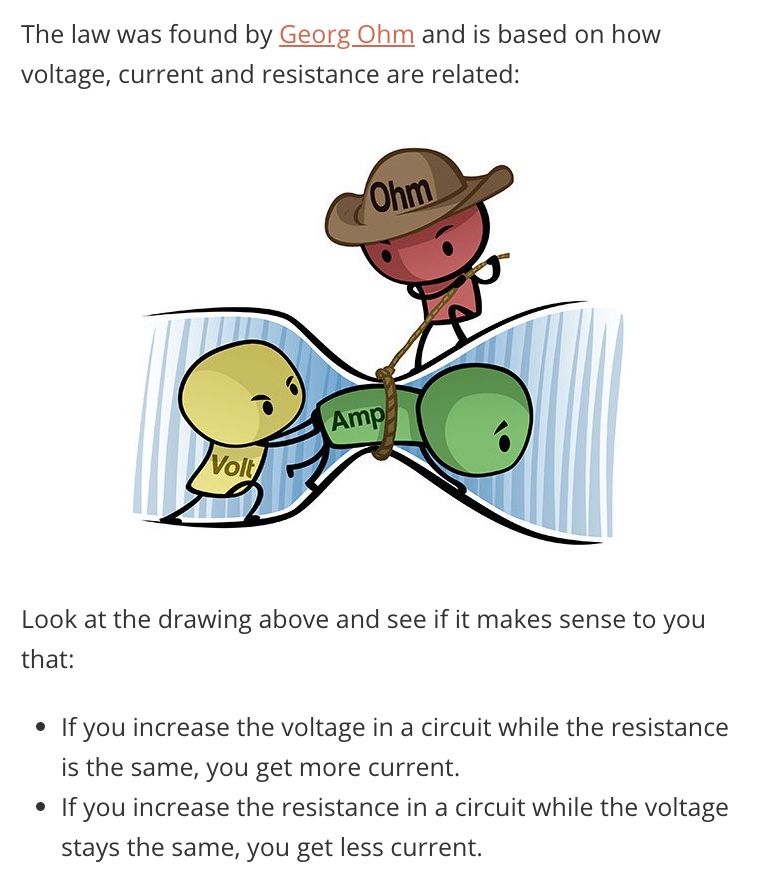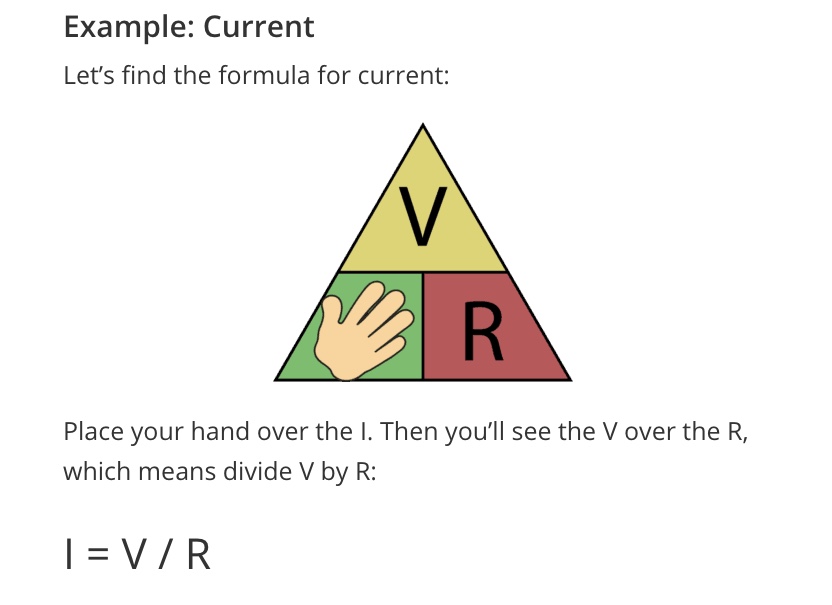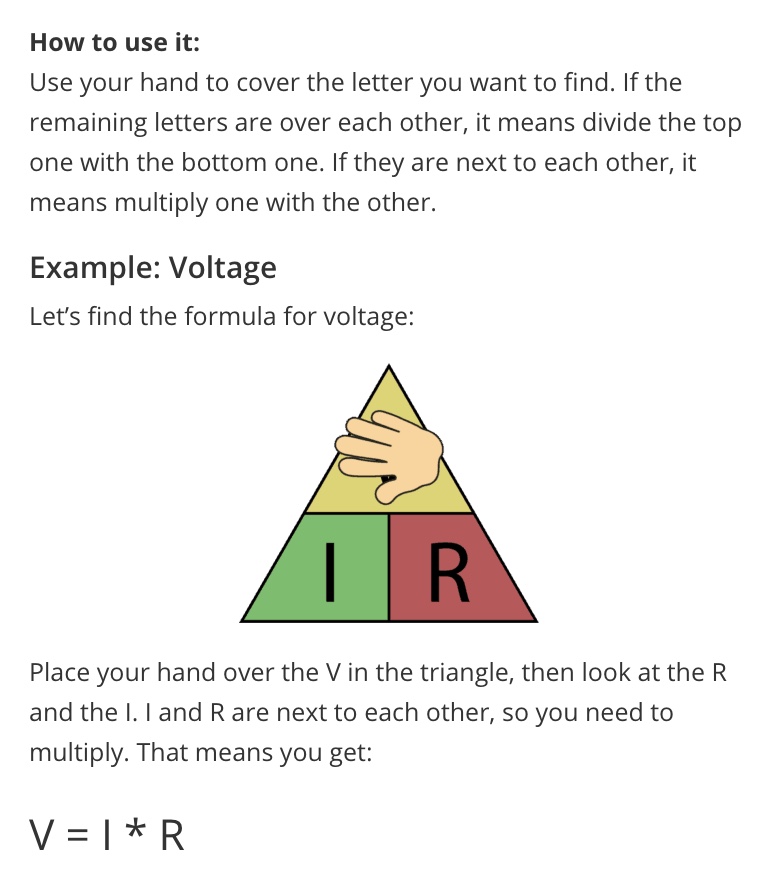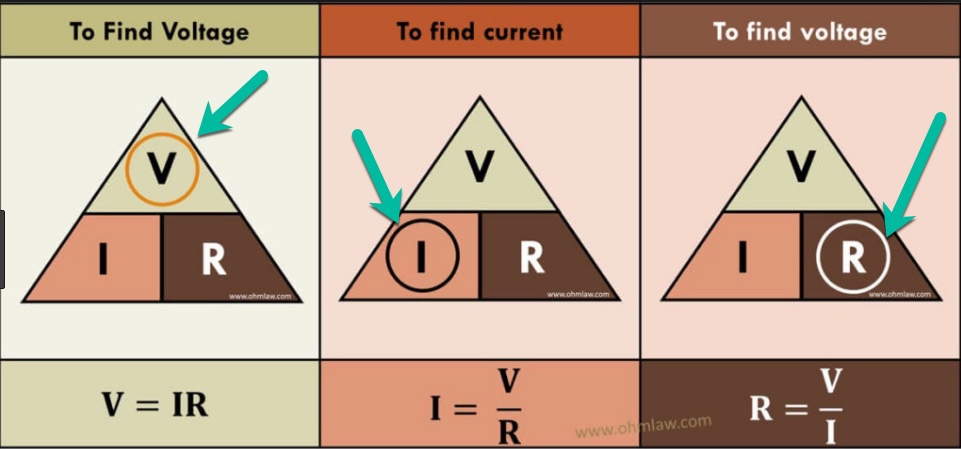Smog Tech
Ohms-Law-Triangle
This information "Ohms-Law-Triangle" is for the new Smog Tech learning the Ohms Law Formula in the Level 1 Smog Class. This is only basic information for the smog tech who is a smog school and would like assistance to help pass the level 1 smog exam.
Picture by Build Electronic circuits

Ohms law was established to discuss electrical pressure (volts) electrical resistance (ohms), and the amount of (current) in amperes flowing through any circuit are all related, which is called ohms law.
My favorite saying with ohms law is saying it requires 1 volt to push 1 ampere through 1 ohm of resistance.
It means if the voltage is double, then the number of amperes will also double.
Smog Tech
Ohms-Law-Triangle
Ohms law stated in a simple formula used to calculated one value of an electrical circuit if the other two values are known.
Here is an example
I = Current as amperes (A)
E = Electromotive force (EMF) is volts (V)
R = Resistance as Ohms.
The current (I) is unknown, but the voltage (E) and resistance are known, then Ohms law can be used to find the answer.
Ohms law can determine the ampere if the volts and amperes are known.

I = E/R or 12E / 4R = 3I
You can state it this way.
12 volts divided by 4 ohms = 3 amps
Ohms law can determine the resistance if the volts and amperes are known.
R = E/I - 12E / 4I = 3R
You can state it this way.
12 volts divided by 4 amps = 3 ohms

To read more on ohms law click here: Understanding Ohms Law
Ohms law can determine the volts if the amperes and resistance are known.
E = I x R – 4I x 3R = 12E
You can state it this way.
4 amps multiply by 3 ohms = 12 volts
Always make sure you are using base numbers before calculating ohms law. An example would be 5K ohms would be converted into 5,000 ohms, and 5ma should turn into 0.005A
Smog Tech: Ohms-Law-Triangle:
Ohms Law applied in a series circuit

The first step is to calculate the total resistance in the circuit, adding all the resistors to get the total resistance. Once done, apply the ohms law formula.
When battery voltage 12 volts applied to a 6 ohms resistor, you can determine there are 2 amps in the circuit. As stated, before if you know 2 factors (12 volts and 6 ohms) amperes can be determined using Ohms law.
A series circuit is a complete circuit that has more than one electrical load where all the current has only one path to flow through all the loads. The circuit must be continuous or have continuity for current to flow through the circuit.
The electrical load needs both a power supply and a ground to operate, an open in the circuit power or ground side in a series circuit will cause the current in the circuit to stop.
Smog Tech: Ohms-Law-Triangle
Series circuit Triangle Questions
Series circuit math examples
A.) 50-volt battery - one resistor is 4 ohms, and the other resistor is 2 ohms, and the third resistor is 4 ohm.
What is the total resistance?
What is ampere?
What is the voltage drop on resistor 4? - ohms
What is the voltage drop on resistor 2? - ohms
What is the voltage drop on resistor 4? - ohm
What is the voltage remaining after the first resistor? - volts
What is the voltage remaining after the second resistor? - volts
What is the voltage remaining after the last resistor? - volts
Smog Tech: Ohms-Law-Triangle
Series circuit Triangle exam answer key
Series circuit math examples answer key
B.) 50-volt battery - one resistor is 4 ohms, and the other resistor is 2 ohms, and the third resistor is 4 ohm.
What is the total resistance? 10
What is ampere? 5A
What is the voltage drop on resistor 4? 20 ohms
What is the voltage drop on resistor 2? 10 ohms
What is the voltage drop on resistor 4? 20 ohm
What is the voltage remaining after the first resistor? 30 volts
What is the voltage remaining after the second resistor? 20 volts
What is the voltage remaining after the last resistor? 0 volts
Smog Tech: Ohms-Law-Triangle
Open Circuits
C.) On the same circuit and the first resistor is open how much voltage is on the circuit before the open? - volts
What is the voltage on the second resistor? - volts
What is the voltage drop on the third resistor? - volts
Smog Tech: Ohms-Law-Triangle
Open Circuits - Exam answer key
D.) On the same circuit and the first resistor is open how much voltage is on the circuit before the open? 50 volts
What is the voltage on the second resistor? 0 volts
What is the voltage drop on the third resistor? 0 volts
Smog Tech: Ohms-Law-Triangle
Parallel circuit - Exam Questions
E.) On a parallel circuit, there are three resistors in parallel, and each one is 12 ohms with a 12-volt battery.
What is the total current in this circuit?
What is the current in each leg or branch?
What is the voltage drop on each leg?
Smog Tech: Ohms-Law-Triangle
Parallel circuit - Exam Questions Answer Key
F.) On a parallel circuit, there are three resistors in parallel, and each one is 12 ohms with a 12-volt battery.
What is the total current in this circuit? 3 amps
What is the current in each leg or branch? 1 amp
What is the voltage drop on each leg? 12 volts
Smog Tech: Ohms-Law-Triangle
Series circuit Laws
The total resistance in a series circuit is the sum of the individual resistance. The resistance values of each electrical load is added together.
The current is constant throughout the entire circuit. If 2 amperes of current leave the battery 2 amperes will return to the battery.
Although the current is constant, the voltage drops across each resistance in the circuit. The voltage drop across each load is proportional to the value of the resistance compared to the total resistance. Remember the sum of all individual voltage drops equals the applied source voltage.
Smog Tech: Ohms-Law-Triangle
Parallel circuits
Smog Tech Parallel Circuits
A parallel circuit is a complete circuit that has more than one path for the current. The separate paths are called branches or legs. The current flow through each branch or leg varies depending on the resistance in each branch.
A break or open in one leg or branch of a parallel circuit does not stop the current flow through the other branches of the parallel circuit.
Smog Tech: Ohms-Law-Triangle
Total Resistance in a Parallel Circuit
Total Resistance in a Parallel Circuit
The easiest way is treating each branch or leg in a parallel circuit as a series circuit. Each leg has its own power and ground and therefore the current through each leg is independent of the current through any other leg.
Another method with two resistors connected in parallel the total resistance (Rt) can be found using the formula Rt = (R1 x R2) / (R1 + R2).
Smog Tech: Ohms-Law-Triangle
Parallel circuit Laws
1.) The total resistance of a parallel circuit is always less than that of the smallest resistance leg. The only reason is that not all the current flows through each leg or branch. With more than one branch current can flow from the battery through those branches a good example would be more vehicles can travel on the road with three lanes compared to a road with only one or two lanes.
2.) The voltage is the same for each leg of a parallel circuit.
3.) The sum of the individual currents in each leg will equal the total current. The amount of current flow through a parallel circuit may vary for each leg depending on the resistance of that leg. The current flowing through each leg results in the same voltage drop as for every other leg of that parallel circuit.
Another Ohms Law Review "Don't Skip"
CLASS SCHEDULES
Emission Control 1:
B.A.R. Smog Check
Inspector Level 1
(Inspector "Smog" License):
Engine Fundamentals
8am - 12:15 pm
Summer Class
7/5/2022 -8/5/2022
Class # 799065
Emission Control 2:
B.A.R. Smog Check
Inspector Level 2
(Inspector "Smog" License):
Rules and Regulations
8am - 12:15 pm
Summer Classes
7/5/2022 - 8/5/2022
Class # 799067
Engine Performance 1:
8am - 12: 15 pm
Date: TBD
Class # 799069
Engine Performance 2:
B.A.R. Specified Diagnostic
and Repair Training
(Repair "Smog" License)
Time: TBD
Date: TBD
Class # 799071
Emission Control 1
(Inspector "Smog" License):
5:00pm - 8:45 pm
Date: TBD
Class # 799065
Emission Control 2:
(Inspector "Smog" License):
5:00pm - 8:45 pm
Date: TBD
Class # 799065
Exhaust Emissions (Update Class):
5:30 pm - 8:45 pm
Tuesday nights:
Dates: coming soon
Class # 796070